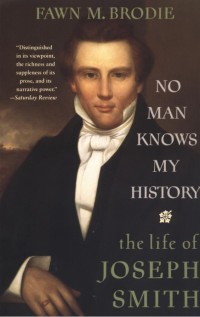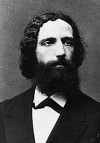No Man Knows My History: The Life of Joseph Smith
By Fawn M. Brodie
First Vintage Books Edition, 1995; originally published by Alfred A. Knopf in 1945. Click to buy this book!
In the Preface of the first edition of her book, author Fawn M. Brodie (1915–1981) sums up the challenges faced by all those who decide to undertake a serious study of the life of Joseph Smith, Jr. (1805–1844), founder of Mormonism: “It was in a funeral sermon that the Mormon prophet flung a challenge to his future biographers. To an audience of ten thousand in his bewitching city of Nauvoo, Joseph Smith said on April 7, 1844: ‘You don’t know me; you never knew my heart. No man knows my history. I cannot tell it; I shall never understand it. I don’t blame anyone for not believing my history. If I had not experienced what I have, I could not have believed it myself.’ Since that moment of candor at least three-score writers have taken up the gauntlet. Many have abused him; some have deified him; a few have tried their hands at clinical diagnosis. All have insisted, either directly or by implication, that they knew his story. But the results have been fantastically dissimilar.” Having been raised in a Mormon family, Fawn McKay Brodie departed from the faith and perhaps wrote her first historic biography as a means of coming to terms with this towering, shadowy and perplexing figure of her childhood. Later she wrote biographies of Thaddeus Stevens, Sir Richard F. Burton, Thomas Jefferson and Richard Nixon, and became the first female professor of history at the University of California, Los Angeles. In the Preface to the 1970 edition of No Man Knows My History she acknowledges “the continuing growth of a considerable literature on human behavior, some of which is decidedly relevant to an understanding of the more baffling aspects of the Mormon prophet’s character.” She points out in the 1970 psychoanalytical Supplement that it is not intended to be a comprehensive clinical portrait, “which would have to be the work of a professional based on much more intimate knowledge of the man than is presently possible.” However, despite these cautious remarks, as well as a statement that “the clinical definitions of 1970 cannot easily be superimposed on the social and political realities of 1840,” her lack of comprehension of Christian esotericism, spirituality and the nature of visionary experience and clairvoyance leaves her little option other than repeating a number of psychological suppositions, such as “unconscious conflicts over his own identity,” “pseudologia fantastica,” “parapath,” “alienated from reality,” “grandiose” and “megalomania.”
From the point of view of Anthroposophy (defined as knowledge of the human being, sophy meaning wisdom and anthro referring to the human being) it would seem that the young, charismatic “Joe Smith” had genuine visionary experiences and may have been deeply connected by destiny with the pre-Christian history of settlement on the American continents by foreign peoples. This awareness could have been awakened in him by a reading of the 1823 publication by Ethan Smith: View of the Hebrews. There would be no wrong at all in the likelihood that the work of Ethan Smith was instrumental in the inspiration of The Book of Mormon. Joseph Smith was also obviously moved by his readings and studies of the Old Testament, particularly Isaiah, which spoke to him personally, and from which he drew strength for his life and his spiritual aspirations. Author Fawn Brodie casts doubt on the originality and authenticity of The Book of Mormon in citing Ethan Smith’s work in particular. More »

